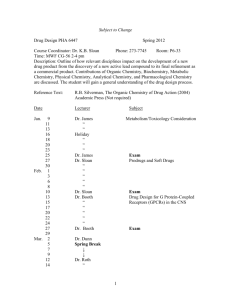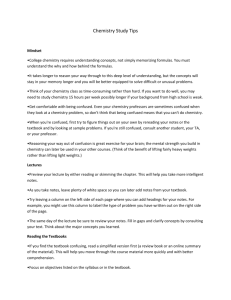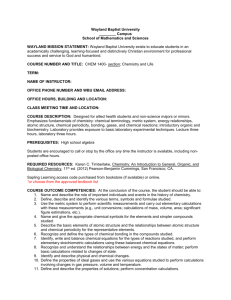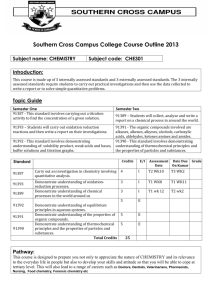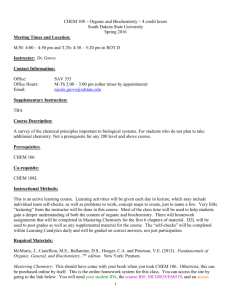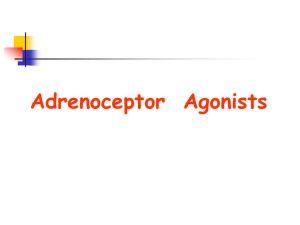Subject to Change Drug Design PHA 6447 Fall 2015 Course
advertisement
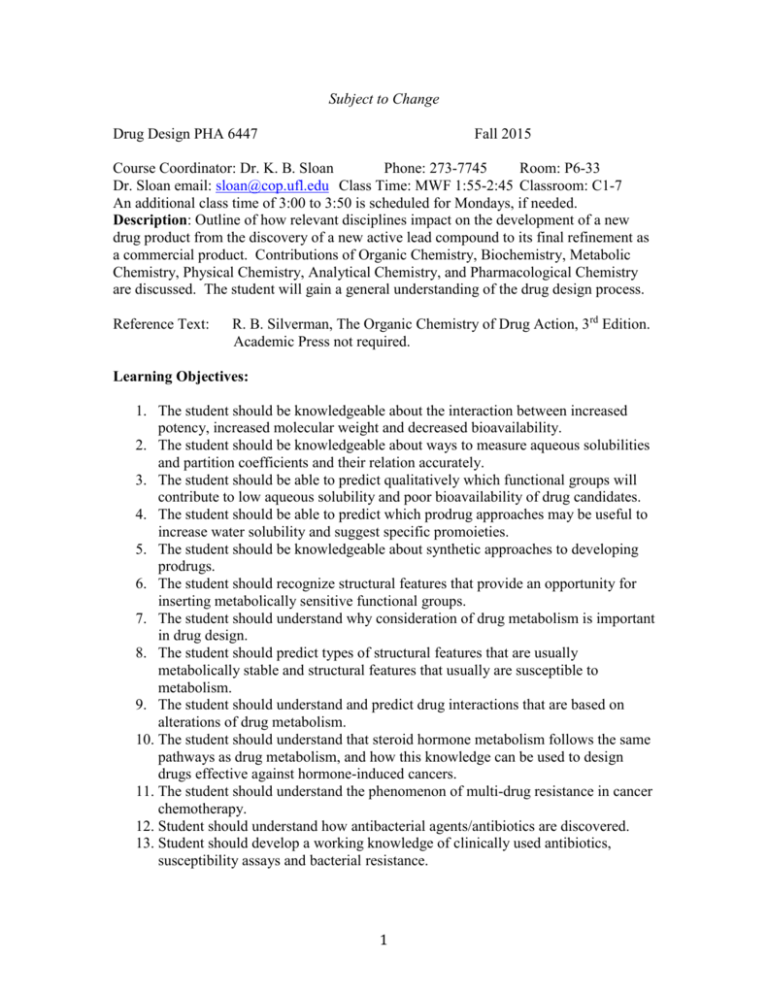
Subject to Change Drug Design PHA 6447 Fall 2015 Course Coordinator: Dr. K. B. Sloan Phone: 273-7745 Room: P6-33 Dr. Sloan email: sloan@cop.ufl.edu Class Time: MWF 1:55-2:45 Classroom: C1-7 An additional class time of 3:00 to 3:50 is scheduled for Mondays, if needed. Description: Outline of how relevant disciplines impact on the development of a new drug product from the discovery of a new active lead compound to its final refinement as a commercial product. Contributions of Organic Chemistry, Biochemistry, Metabolic Chemistry, Physical Chemistry, Analytical Chemistry, and Pharmacological Chemistry are discussed. The student will gain a general understanding of the drug design process. Reference Text: R. B. Silverman, The Organic Chemistry of Drug Action, 3rd Edition. Academic Press not required. Learning Objectives: 1. The student should be knowledgeable about the interaction between increased potency, increased molecular weight and decreased bioavailability. 2. The student should be knowledgeable about ways to measure aqueous solubilities and partition coefficients and their relation accurately. 3. The student should be able to predict qualitatively which functional groups will contribute to low aqueous solubility and poor bioavailability of drug candidates. 4. The student should be able to predict which prodrug approaches may be useful to increase water solubility and suggest specific promoieties. 5. The student should be knowledgeable about synthetic approaches to developing prodrugs. 6. The student should recognize structural features that provide an opportunity for inserting metabolically sensitive functional groups. 7. The student should understand why consideration of drug metabolism is important in drug design. 8. The student should predict types of structural features that are usually metabolically stable and structural features that usually are susceptible to metabolism. 9. The student should understand and predict drug interactions that are based on alterations of drug metabolism. 10. The student should understand that steroid hormone metabolism follows the same pathways as drug metabolism, and how this knowledge can be used to design drugs effective against hormone-induced cancers. 11. The student should understand the phenomenon of multi-drug resistance in cancer chemotherapy. 12. Student should understand how antibacterial agents/antibiotics are discovered. 13. Student should develop a working knowledge of clinically used antibiotics, susceptibility assays and bacterial resistance. 1 14. Student should understand the role of quorum sensing and bacterial biofilms in disease. 15. Student should understand new and innovative antibacterial strategies aimed at targeting quorum sensing and bacterial biofilms. 16. Students are expected to be familiar with the major types of bioactive natural products, and understand their biosynthetic mechanism. 17. Students are expected to understand the current approaches in discovering drug leads from natural products. 18. Students are expected to appreciate biocatalysis in drug discovery, development, and production, to know general tools for biocatalyst development, and to design simple biocatalysts-based routes to drugs. 19. Students are expected to understand general concepts of synthetic biology, to understand their applications in natural products-based drug discovery and development, and to design simple biosynthetic biology system. 20. Student should be able to interpret quantitative pharmacological data, and understand how key pharmacological parameters (e.g. IC50/EC50, Kii, pA2/KB) are determined. 21. Student should understand the meaning of key pharmacological terms (affinity, efficacy/intrinsic activity, potency, selectivity, agonist/partial agonist/antagonist/inverse agonist) and how they are determined. 22. Student should understand the basic principles of receptor theory and how they affect the observed activity of compounds at receptors. 23. Student should understand the basic procedures for determining receptor affinity, and agonist/antagonist activity. 24. Student should be able to assess the role of natural products in drug discovery. 25. Student should be able to recognize limitations and advantages of natural products based drug discovery. 26. Student should be able to become familiar with modern screening methods. 27. Student should be able to understand strategies to determine targets and mechanisms of drug action. Date Aug. Sep. 24 26 28 31 2 4 7 9 11 14 16 18 21 23 Lecturer Dr. James “ “ “ “ “ Labor Day Exam Dr. Luesch “ “ “ “ “ Subject Role of Drug Biotransformation in Drug Discovery Natural Products vs High Throughout Screening 2 Oct. Nov. Dec. 25 28 30 2 5 7 9 12 14 16 19 21 23 26 28 30 2 4 6 9 11 13 16 18 20 23 25 27 30 2 4 7 9 Exam Dr. Aldrich “ “ “ “ “ Exam Dr. Sloan “ “ “ “ “ Exam Dr. Huigens “ “ Homecoming “ Veterans Day “ “ Exam Dr. Ding “ Thanksgiving Thanksgiving “ “ “ “ Exam Introduction to Pharmacology Scaling the Solubility Barrier Discovery of New Antibacterial Agents Nature Inspired Drug Discovery, Development and Production EXAMS AND GRADING: Format: The format of the course will involve lectures using combinations of chalk-board presentations, overhead projection and handouts to deliver the materials. Evaluation: The students will be evaluated in six exams each worth 17% of the final points for the course. They will involve structure, short or numerical answers. Students will be allowed to inspect their exams to verify their scores but exam will be kept by the faculty for three years. 3 Grading will be on a point basis with >90 (A), >87 (A-), >83 (B+), >80 (B), >77 (B-), >73 (C+), >70 (C), >67 (C-), >63 (D+), >60 (D), >57 (D-), >53 (E). There will be no make-up exams. Miscellaneous: Class attendance is not mandatory. However, the student will be tested on the lecture material and in-class handouts, which, for the most part, are not covered in precisely the same way in any available textbook. Students requesting classroom accommodation must first register with the Dean of Students Office. The Dean of Students Office will provide documentation to the student who must then provide this documentation to the Instructor when requesting accommodation. Students are expected to complete assignments and take quizzes with integrity. Academic dishonesty will not be tolerated. If a student commits academic dishonesty, the academic penalty will be a failing grade in the course. The UF policies and procedures on academic dishonesty will be followed. 4
